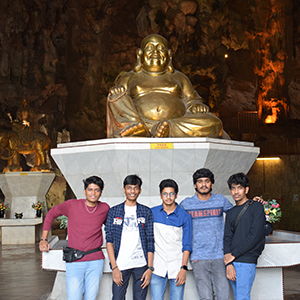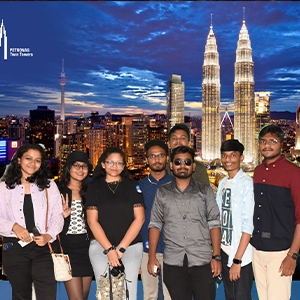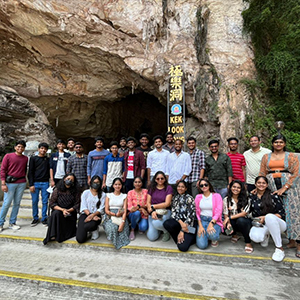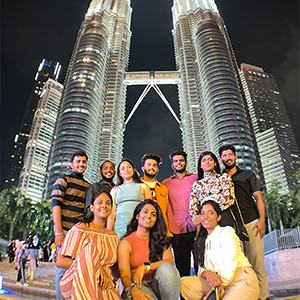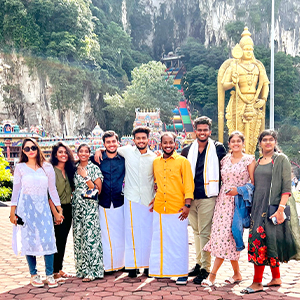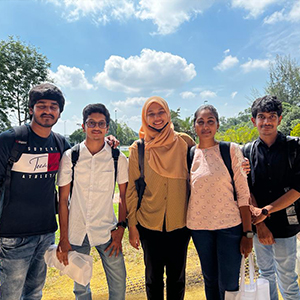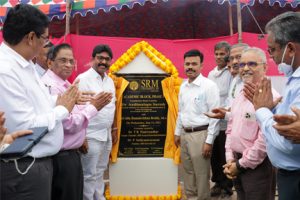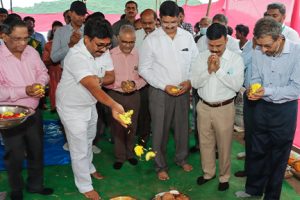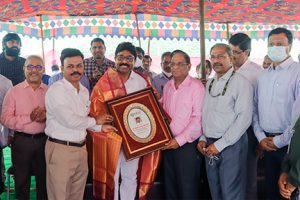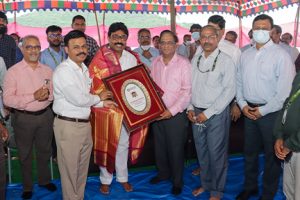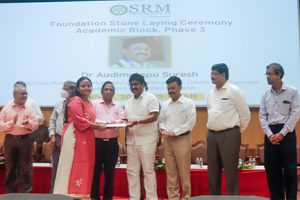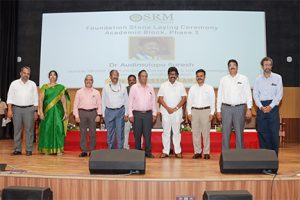Sustainable biorefinery approaches for a circular economy
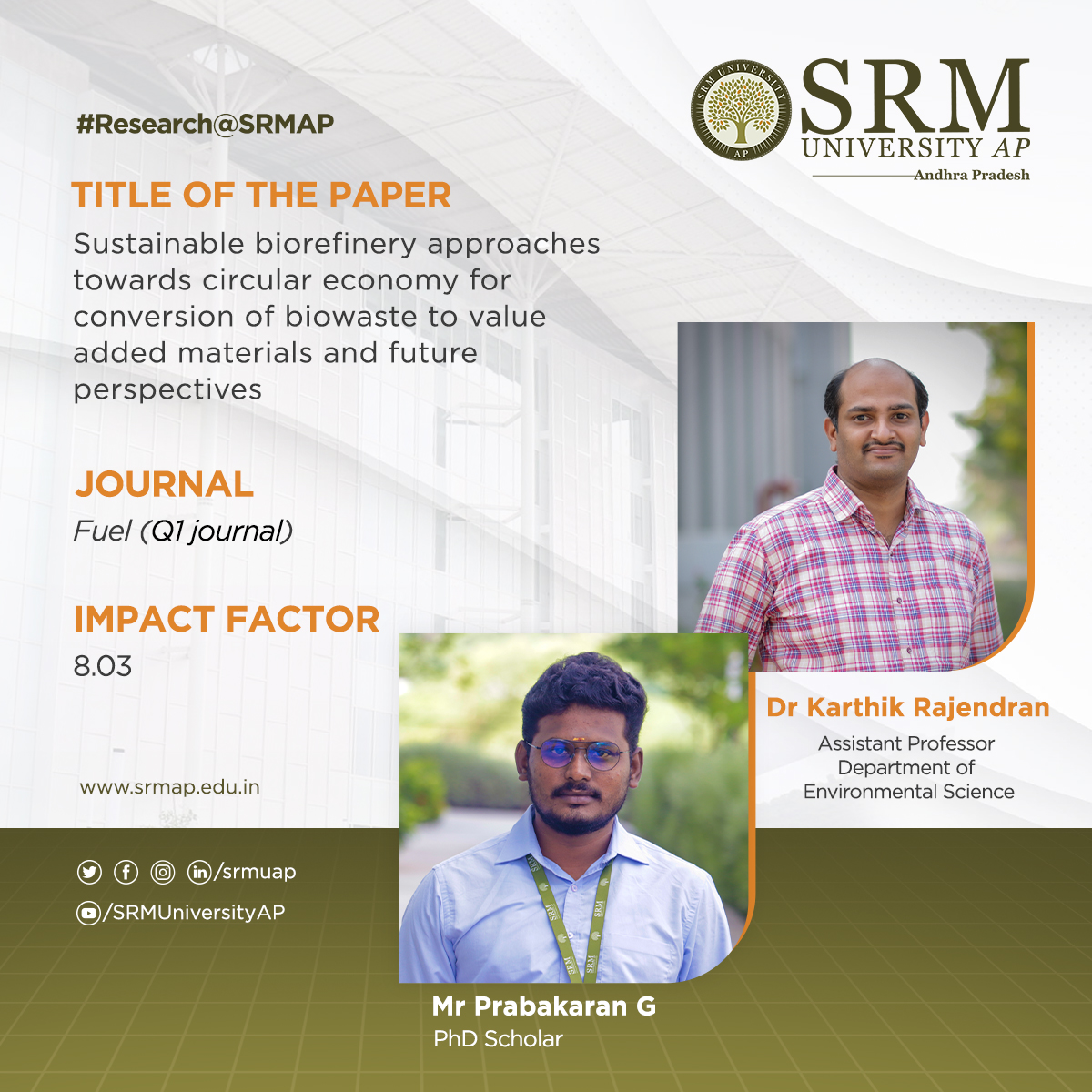 Worldwide, 1.3 billion tons of bio-waste are generated annually. By 2025, this is predicted to be increased by 2.2 billion tons/year. The emerged biowaste biorefinery has proved as a sustainable approach for integrated bioproducts, such as bioenergy, biopolymers, biochemicals, bioplastics, and biofertilizers further used for industrial, commercial, agricultural, and energy applications. Integrating biorefinery concepts into biowaste management is promising for a circular bioeconomy. Recent research at the Department of Environmental Sciences investigates the potential of sustainable biorefinery approaches. Assistant professor Dr Karthik Rajendran and his PhD scholar Mr. Prabakaran G published a paper, Sustainable biorefinery approaches towards circular economy for conversion of biowaste to value added materials and future perspectives, in Fuel, a Q1 journal, with an impact factor of 8.03. For this paper, they have collaborated with Dr Mukesh Kumar Awasthi from the College of Natural Resources and Environment, Northwest A&F University, China.
Worldwide, 1.3 billion tons of bio-waste are generated annually. By 2025, this is predicted to be increased by 2.2 billion tons/year. The emerged biowaste biorefinery has proved as a sustainable approach for integrated bioproducts, such as bioenergy, biopolymers, biochemicals, bioplastics, and biofertilizers further used for industrial, commercial, agricultural, and energy applications. Integrating biorefinery concepts into biowaste management is promising for a circular bioeconomy. Recent research at the Department of Environmental Sciences investigates the potential of sustainable biorefinery approaches. Assistant professor Dr Karthik Rajendran and his PhD scholar Mr. Prabakaran G published a paper, Sustainable biorefinery approaches towards circular economy for conversion of biowaste to value added materials and future perspectives, in Fuel, a Q1 journal, with an impact factor of 8.03. For this paper, they have collaborated with Dr Mukesh Kumar Awasthi from the College of Natural Resources and Environment, Northwest A&F University, China.
Biorefinery is designed to improve the economic potential and achieve a circular bioeconomy by integrating various technologies such as pyrolysis, anaerobic digestion, gasification, incineration, and aerobic composting to gain energy, nutrients, and material recovery. Biowaste biorefinery contributes as a driving force to cope with challenges of resource scarcity, climate changes, and increased demand. The sustainable biorefinery approaches toward circular bioeconomy require a comprehensive understanding of the biowaste across the value chain. Based on the carbon neutralized biowaste biorefinery concept, this paper explained biowaste generation and utilization as a renewable resource through biorefinery techniques from the perspective of energy, nutrients, and material recovery. Meanwhile, clarify the implementation status, public engagement, and prospects of biowaste recycling with the central concept of biorefinery circular bioeconomy.
Abstract
With the colossal energy demand inevitably exacerbating the non-renewable resources depletion and ecological-social challenges, renewable energy has become a crucial participant in sustainable strategy. Biorefinery emerged as a sustainable approach and recognized promising transformation platforms for products to achieve a circular bioeconomy that focuses on biomass efficiency and sustainable valorisation, promotes resource regeneration, and restorative. The emerged biowaste biorefinery has proved as a sustainable approach for integrated bioproducts and further applied this technology in industrial, commercial, agricultural, and energy sectors. Based on carbon-neutral sustainable development, this review comprehensively explained biowaste as renewable resource generation and resource utilisation technologies from the perspective of energy, nutrient, and material recovery in the concept of biorefinery. Integrating biorefinery concepts into biowaste management is a promise for the conversion of biowaste into value-added materials. It contributes as a driving force to cope with resource scarcity, climate changes, and huge material demand in a circular bioeconomy. In practice, the optimal of biorefinery technologies depends on environmentally friendly, economic and technical feasibility, and social and policy acceptance. Additionally, policy interventions are necessary to promote biowaste biorefinery implements for a circular bioeconomy and contribute to a low-carbon cleaner environment.
- Published in Departmental News, ENVS News, News, Research News
Familiarisation Programme at UTP Malaysia
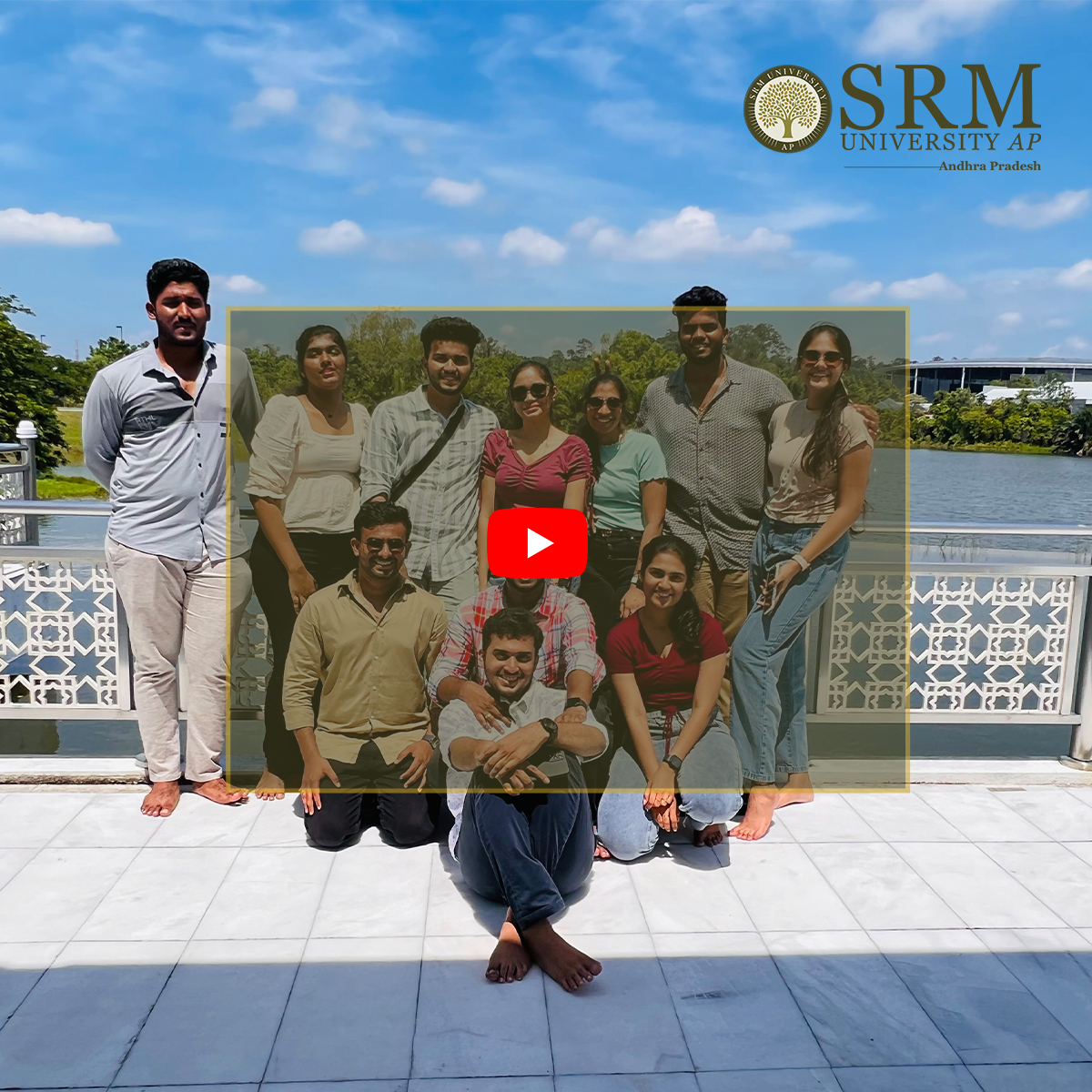 Students from the second batch of students from SRM University-AP, Andhra Pradesh, has completed the Familiarisation Programme at Universiti Teknologi PETRONAS (UTP), Malaysia in the month of June. This is part of Global Immersion facilitated by the Office of International Relations and Higher Studies at SRM AP.
Students from the second batch of students from SRM University-AP, Andhra Pradesh, has completed the Familiarisation Programme at Universiti Teknologi PETRONAS (UTP), Malaysia in the month of June. This is part of Global Immersion facilitated by the Office of International Relations and Higher Studies at SRM AP.
Students and faculty mentors from SRM AP participated in several on and off-campus activities such as campus tours, cultural exchange, and recreational activities in UTP Malaysia. There were educational trips to Kuala Lumpur and PETRONAS Twin Towers. The students were accompanied by Dr Ashu Abdul , Assistant Professor at SRM University-AP.
In the five-day programme, SRM University-AP students enrolled in two non-credited courses – Introduction to Technical Reporting & Latex Scripting and Data Analysis with R Statistics. The students were introduced to UTP’s facilities, programmes, research capabilities, and campus life as a part of the Familiarisation Programme.
UTP Centre for Student Development (CSD) thanked SRM University-AP for entrusting them to provide our students with a global experience by participating in this programme.
- Published in International Relations, IR-News, News
Foundation laid for Phase III infrastructure development
Hon’ble Minister Dr Audimulapu Suresh ensured support of the State Government in the ongoing developmental projects
The foundation stone is laid for the third phase of infrastructure development at SRM University-AP. Dr Audimulapu Suresh, Hon’ble Minister for Municipal Administration & Urban Development, Government of Andhra Pradesh expressed his happiness in laying the foundation for the Phase III development on the auspicious day of Guru Purnima. “ I appreciate the role of SRM AP as a level playing field in the education sector in Andhra Pradesh”, he said.
In the initial phases, two Academic Blocks, Administrative Block, Research Building, Dining areas, an auditorium, and six Hostel buildings were completed and they are functioning fully-fledged. Dr P Sathyanarayanan, President of SRM University-AP elaborated on the ten thousand square feet project of the new phase. “Bricks and mortar won’t speak for itself, it is the faculty, students, and their opportunities that make a university and we have a proven track record of achievers in research, entrepreneurship, placement, and higher studies”, he added.
A slew of facilities for research, innovation, and entrepreneurship, will be open to the students in the new phase. In a statement, Dr T R Paarivendhar, the Founder Chancellor-SRM Group of Educational Institutions said that these new projects are going to give a huge impetus to the modern education ecosystem of Andhra Pradesh. The new phase will house Centres of Excellence focusing on areas of Artificial Intelligence & Machine Learning, Data and Analytics, Sustainability, and other futuristic areas of research and innovation, in addition to the state-of-art classrooms.
In his address, Pro-Vice-Chancellor Prof D Narayana Rao highlighted the gamut of opportunities at SRM University-AP. Hon’ble Minister Dr Audimulapu Suresh also acknowledged the contributions of SRM group of institutions in bridging the gap between the haves and have-nots. Vice-Chancellor Prof V S Rao stated that SRM AP is the first educational institute established with a global vision of providing quality education and international exposure to the students of Andhra Pradesh.
The Minister distributed certificates and President’s scholarship upto ₹ 5,00,000 to the Class of 2022 who started successful entrepreneurial ventures, obtained Marquee Placement offers and secured Higher studies opportunities in Top QS 50 global universities. APSCHE Chairman Hemachandra Reddy and University Registrar Dr R Premkumar were also present in the event held at the auditorium following the stone laying ceremony.
- Published in News
Optimised copper nanoclusters for bio imaging applications
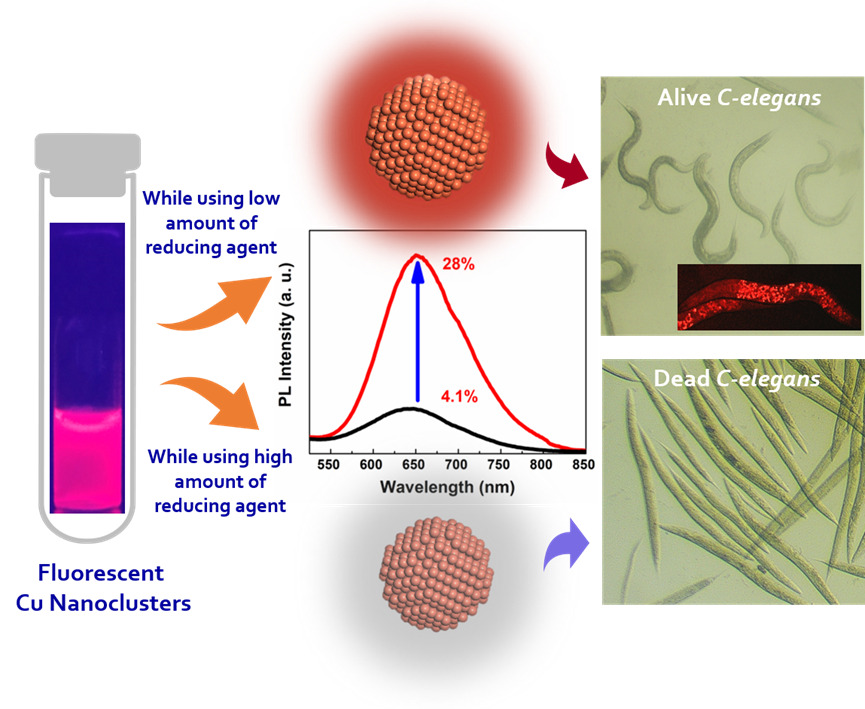
Inspite of being a plentiful and inexpensive metal, the use of copper nanoclusters is limited in bio-medical research because of their toxicity and low stability due to its easily oxidizable nature. It also has a low quantum yield. The interdisciplinary publication of the researchers at SRM University-AP successfully addressed these constraints, resulting in strong fluorescence, superior colloidal stability, and non-toxicity of copper nanoclusters for bio imaging applications. The research was a collective work of Dr Manjunatha Thondamal from the Department of Biological Sciences, Dr Mahesh Kumar Ravva and Dr Sabyasachi Chakrabortty from the Department of Chemistry along with their PhD scholars; Mr Kumar Babu Busi, Ms Kotha Jyothi, Ms Sheik Haseena, Ms Shamili Bandaru and Ms Jyothi Priyanka Ghantasala.
The article titled ‘“Engineering colloidally stable, highly fluorescent and nontoxic Cu nanoclusters via reaction parameter optimization” was featured in the prestigious Q1 journal RSC Advances (IF: 4.036), published by the ‘Royal Society of Chemistry’. They successfully prepared the protein stabilised copper nanoclusters inside the aqueous medium with exceptional optical properties. To the best of their knowledge, the reported colloidal stability and quantum yield of their as-synthesized Cu NCs are the highest reported in the literature, where the emission wavelength is in the red region. Also, optimised copper nanoclusters showed excellent biocompatibility towards solid cancer cell lines and C. elegans as in vitro and in vivo environments. Thus, these red colour luminescent copper nanoclusters were becoming a suitable fluorescent probe for deep tissue penetration, photodynamic, photothermal and diagnostic applications.
Abstract of the Research
Metal Nanoclusters (NCs) composed of the least number of atoms (few to tens) became very attractive for their emerging properties owing to their ultrasmall size. Preparing copper nanoclusters (Cu NCs) in an aqueous medium with high emission properties, strong colloidal stability, and low toxicity has been a long-standing challenge. Although they are earth-abundant and inexpensive, they are comparatively less explored due to their limitations such as ease of surface oxidation, poor colloidal stability, and high toxicity. To overcome these constraints, we established a facile synthetic route by optimizing the reaction parameters, especially altering the effective concentration of the reducing agent to influence their optical characteristics. The improvement of photoluminescence intensity and superior colloidal stability was modelled from a theoretical standpoint. Moreover, the as-synthesized Cu NCs showed a significant reduction of toxicity in both in vitro and in vivo models. The possibilities of using such Cu NCs as a diagnostic probe towards C. elegans were explored. Also, the extension of this approach towards improving the photoluminescence intensity of the Cu NCs on other ligand systems was demonstrated.
- Published in Biology News, Chemistry-news, Departmental News, News, Research News
Dr Debabrata Pramanik
- Published in Assistant Professor, Faculty, Physics Faculty, SEAS
DST-INSPIRE Subject Expert Committee Meeting
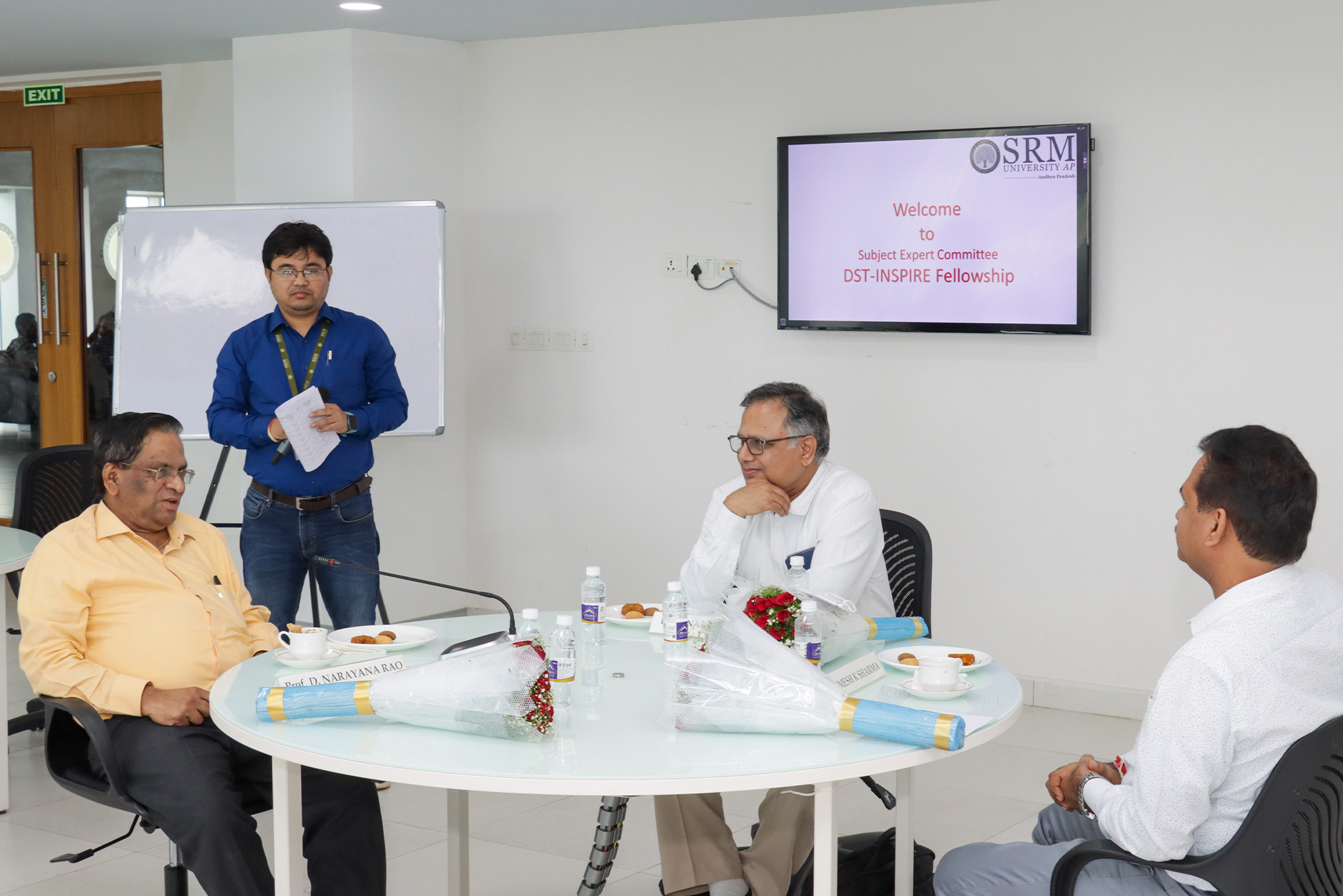 A two-day DST-INSPIRE Subject Expert Committee meeting was held on July 14 & 15 at SRM University-AP campus. Experts in the area of Physical Sciences from across the country gathered at the university to evaluate this year’s INSPIRE Fellowship applications in Physical Sciences.
A two-day DST-INSPIRE Subject Expert Committee meeting was held on July 14 & 15 at SRM University-AP campus. Experts in the area of Physical Sciences from across the country gathered at the university to evaluate this year’s INSPIRE Fellowship applications in Physical Sciences.
INSPIRE Fellowship component offers 1000 Fellowships every year for carrying out doctoral degrees in both basic and applied sciences, including engineering and medicine, in the age group of 22-27 years.
The Chairperson of the Expert Committee in the area of Physical Sciences was Dr Dinakar Kanjilal, Professor, Inter-University Accelerator Centre (IUAC), New Delhi. “The fellowship ensures geographical distribution of excellence, and we look forward to more applicants from SRM AP”, Prof. Kanjilal said. Since its inception, SRM University-AP has INSPIRE Fellows as faculty members in the various departments of Sciences.
University Pro-Vice-Chancellor Prof D Narayana Rao, who also is the co-chair of the expert committee, said that it is gratifying to know that the PhD students have chosen to enrol in reputed universities and institutes. The applicants have chosen extremely accomplished scientists and faculty members as their research supervisors. “We are glad that 61 are girl students out of the 116 applications we received”, highlighted Prof D Narayana Rao. He expressed his happiness about the increasing number of women representation in Indian academia.
The other eminent scientists in the INSPIRE Fellowship selection committee included Member Secretary Dr Umesh K Sharma, Prof. Shikha Verma, Dr G. Vijaya Prakash, Dr AnandamayeeTej, Dr Rajendra Prasad Pant and Dr Arjit Chowdhuri.
Innovation in Science Pursuit for Inspired Research (INSPIRE)” is a flagship scheme of the Department of Science and Technology (DST), Government of India, which aims to attract meritorious youth to study basic and natural sciences at the college and university level and to pursue research careers in both basic and applied science areas including engineering, medicine, agriculture, and veterinary sciences.
- Published in Departmental News, News, Physics News, Research News


